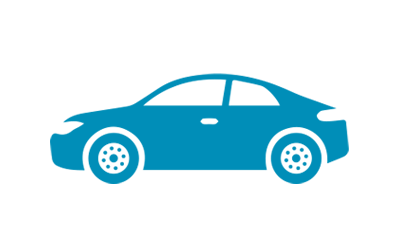Other Grants and Rebates
Learn about other grants for electric cars and charging.
| Other Programs | New EV | Used EV | EV Home Charging or EV Charge Card | Stackable with Clean Cars for All? |
| DCAP Financial Assistance |
$7,500
|
$7,500
|
up to $2,000
|
|
| Federal Tax Credit |
up to $7,500
|
up to $4,000
|
||
| MCE Instant EV Rebate |
$3,500
|
$2,000
|
||
| PG&E Pre-Owned EV Rebate |
$1,000-$4,000
|
|||
| PCE Instant Used EV Rebate |
$2,000
|
|||
| SVCE Instant EV Rebate |
$2,000
|
$2,000
|
||
| SJCE Instant EV Rebate |
$4,000
|
$2,000
|
* Incentives are not stackable but low interest loans may be available.
** CCFA Participants can only stack with SJCE EV Instant Rebate if purchasing a battery-electric vehicle.
Access Clean California (ACC): ACC is a statewide project that connects income-qualified residents with clean energy and transportation benefits. Use their Benefits Finder tool to check if you qualify for other local or state benefits that may are stackable with Clean Cars for All.
Vehicles
California Clean Vehicle Rebate Project (CVRP)
The California Clean Vehicle Rebate Project offered rebates of up to $7,500 for the purchase or lease of new, eligible zero-emission vehicles. CVRP closed on November 8, 2023 and does not plan on reopening.
Driving Clean Assistance Program (DCAP) - Financial Assistance
Through a partnership with the California Air Resources Board, Community Housing Development Corporation (CHDC) is proud to offer the opportunity for program qualified participants to purchase or lease a new or used plug-in hybrid electric vehicle (PHEV), battery electric vehicle (BEV), or fuel cell electric vehicle (FCEV).
- Eligible participants can receive up to $7,500 down-payment assistance.
- The program does not require eligible participants to scrap an older model gasoline-powered vehicle to participate.
- A statewide network of Credit Union partners is available for eligible participants, including participants with challenged or no credit, offering up to $45,000 of financing at 8% APR or less.
- Approved participants can choose either a rebate of up to $2,000 to purchase and install a home charger, or a $2,000 prepaid charge card for public charging.
- Bay Area Residents cannot stack Financial Assistance with the Bay Area Air District's Clean Cars for All program, and are not eligible to participate in DCAP's CC4A Scrap and Replace program.
FasTrak Discount
Eligible Clean Air Vehicles (CAVs) receive discounts on all state-owned Bay Area toll bridges (but not the Golden Gate Bridge) and toll-free travel in express lanes.
High-Occupancy Vehicle (HOV) Lane Access
The Clean Air Vehicle (CAV) program is administered by the Department of Motor Vehicles (DMV) in partnership with the California Air Resources Board (ARB). The program authorizes a qualifying vehicle that meets specified emissions standards to be issued a CAV decal to allow single occupancy use of High Occupancy Vehicle (HOV or carpool) lanes.
Note: For a vehicle purchased on or after January 1, 2018, the DMV cannot issue a CAV decal to an applicant who has received a consumer rebate through the Clean Vehicle Rebate Project (CVRP). An applicant whose gross annual income is above specified thresholds must choose between a CAV decal or a CVRP rebate.
MCEv Program
MCE offers up to $3,500 toward the purchase or lease of a new or used EV or PHEV for eligible customers at participating dealerships. To be eligible, must be an MCE customer, located in MCE’s service area, purchase or lease a qualifying new or used EV or plug-in hybrid from a participating dealership, keep your EV for at least 24 consecutive months after the vehicle purchase or lease date, and either be enrolled in a specific low-income program (a list of the programs is available on their website) or meet income qualifications. Rebate can only be applied at the point of purchase by participating dealers. For more information, visit MCE EV Instant Rebates or contact the EV Instant Rebate support team at (628) 272-9910.
Pacific Gas and Electric – Pre-Owned Electric Vehicle Rebate Program
PG&E Pre-Owned Electric Vehicle program offers all qualifying electric service customers two levels of incentives when they purchase or lease a preowned battery electric or plug-in hybrid vehicle. A $1,000 standard rebate or a Rebate Plus option of $4,000 for applicants who meet specific income-based requirements.
Peninsula Clean Energy – Used EV Rebate Program
Residents living in San Mateo County and the City of Los Banos can receive a rebate of up to $2,000 to offset the purchase price of a used EV. Residents do not need to apply prior to purchasing their EV to be eligible, but must ensure they meet eligibility requirements and their used EV is eligible.
San Jose Clean Energy – New and Used EV Rebate Program
San José Clean Energy (SJCE) offers discounts to make EVs more accessible for San José residents. SJCE's EV Instant Rebate program offers income-qualified residents $2,000 off a used EVs, and $4,000 off a new EV, instantly at SJCE participating dealers. Customers can choose from a variety of battery-electric vehicles and stack these incentives with other available incentives to save even more.
- SJCE customers only
- Purchased vehicle must be registered at SJCE-eligible residential service address
- The rebate can be used for both buying and leasing
- Stackable with Clean Cars for All only if buying a battery-electric vehicle (no plug-in hybrids or fuel-cell vehicles)
- Funding is limited and available on a first-come, first-served basis
- It’s easy to participate. Visit https://sanjosecleanenergy.org/ev-rebates/ for qualifying vehicles, participating dealers and more.
Silicon Valley Clean Energy (SVCE) - New and Used EV Rebate Program
SVCE's program provides income-eligible customers with a $2,000 rebate towards the purchase or lease of a new or pre-owned electric vehicle or plug-in hybrid EV. Customers will be able to claim the rebate instantly at the point-of-sale from a growing network of participating local dealerships, or after purchase. This rebate is fully stackable with federal and other regional EV incentives.
UBER's Go Electric Incentive
Uber “Diamond” drivers in California who are interested in switching to an EV may qualify for Uber’s $4,000 Go Electric Incentive. Uber drivers interested in this incentive must first apply prior to switching to an EV and complete 100 eligible rides by April 30, 2026.
Charging
MCE Sync
MCE Sync is a smart phone app managed by EV.Energy that automates customers' home EV charging to use the least expensive and cleanest energy on the grid, while fully charging their EVs when they need it. Participants earn a one-time $50 enrollment bonus and up to $10 monthly for smart charging their EV. The average household with an EV will also save an additional $100 per year on their electricity bills! To be eligible for MCE Sync, you must be an MCE customer located in MCE’s service area and have a compatible EVs or home chargers (list of compatible EVs and chargers is available on their website). You can be enrolled in any residential electricity rate plan; greater bill savings may be seen on an EV or other Time-of-Use rate.
Pacific Gas and Electric – Electric Vehicle Rate Plans
PG&E offers two electric vehicle rate plans for residential customers. Home Charging, EV2-A combines your vehicle's electricity costs with those of your residence. EV-B involves the installation of another meter, which separates your vehicle's electricity costs from those of your home.
Pacific Gas and Electric – Residential Charging Solutions
PG&E’s Residential Charging Solutions program offers PG&E customers a rebate on pre-approved electric vehicle charging equipment covering 50 to 100 percent of the purchase price.
Sonoma Clean Power – GridSavvy
Connect your existing and compatible electric vehicle charger to GridSavvy Rewards and earn $5/month*. By connecting your EV charger, charging speeds will be automatically slowed to ease stress on the electric grid during times of high electricity use.
Enroll your Electric Vehicle in GridSavvy Rewards to earn incentives and charge at the cheapest and greenest times.
Other
Contra Costa County e-bike Rebate
The Contra Costa County e-bike Rebate offers rebates of $150 to $500 to Contra Costa County residents. Applicants can apply for a new e-bike purchased within the last 6 months, and one rebate is permitted per person and one rebate per home residence. The e-bike rebate is $150 for eligible applicants; for income qualified, the rebate is $300; and for those income qualified and reside in Antioch, Bay point, Concord, Pittsburg, Richmond, or San Pablo applicants are eligible for the $500 rebate.
State of California – Consumer Assistance Program Vehicle Retirement
The Consumer Assistance Program (CAP) is administered by the Bureau of Automotive Repair. The purpose of CAP is to improve California's air quality by reducing vehicle emissions. If you own an operational vehicle that recently passed or failed a Smog Check inspection, you may be eligible to receive an incentive to retire your vehicle. Participants may not receive funding from Clean Cars for All if they receive funding from CAP for the same vehicle being retired (based on Vehicle Identification Number).
- Income-eligible consumers who meet program eligibility requirements may receive $1,500
- All other eligible consumers may receive $1,000
Vehicle Buy Back Program
The Vehicle Buy Back Program (VBB) will pay Bay Area residents $1,500 to scrap their operable, registered 1998 or older vehicle. For your vehicle to be eligible, it must meet Vehicle Eligibility Requirements and pass a Vehicle Eligibility Inspection (we website for complete details). Participants may not receive funding from Clean Cars for All if they receive funding from VBB for the same vehicle being retired (based on Vehicle Identification Number).





